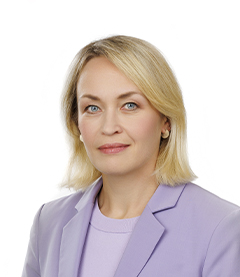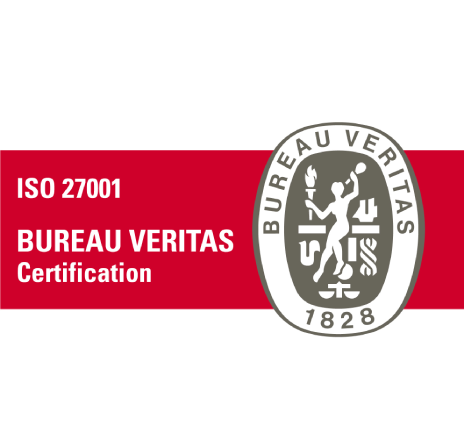-
Other audit services
We help clients with the application and use of foreign financial aid of EU and other funds and help prepare financial reports.
-
Audit calculator
The calculator will answer if the company's sales revenue, assets or number of employees exceed the limit of an inspection or audit.
-
Payroll and related services
We perform payroll accounting for companies whether they employ a few or hundreds of employees.
-
Tax accounting
Grant Thornton Baltic's experienced tax specialists support accountants and offer reasonable and practical solutions.
-
Reporting
We prepare annual reports in a timely manner. We help to prepare management reports and various mandatory reports.
-
Consolidation of financial statements
Our experienced accountants and advisors help you prepare consolidation tables and make the consolidation process more efficient.
-
Consultancy and temporary staff
Our experienced specialists advise on more complex accounting transactions, rectify poor historic accounting, and offer the temporary replacement of an accountant.
-
Outsourced CFO service
Our CFO service is suitable for companies of all sizes and in all industries. We offer services to our clients in the required amount and competences.
-
Assessment of accounting processes
We help companies to implement accounting practices that are in compliance with local and international standards.
-
Accounting services for small businesses
We offer affordable service for small businesses. We help organize processes as smartly and cost-effectively as possible.
-
Cryptocurrency accounting
We keep up with blockchain technology to serve and advise crypto companies. We are supported by a network of colleagues in 130 countries.
-
Trainings and seminars
Our accountants have experience in all matters related to accounting and reporting. We offer our clients professional training according to their needs.

-
Business advisory
We offer legal support to both start-ups and expanding companies, making sure that all legal steps are well thought out in detail.
-
Fintech advisory
Our specialists advise payment institutions, virtual currency service providers and financial institutions.
-
Corporate advisory
We advise on legal, tax and financial matters necessary for better management of the company's legal or organizational structure.
-
Transaction advisory
We provide advice in all aspects of the transaction process.
-
Legal due diligence
We thoroughly analyze the internal documents, legal relations, and business compliance of the company to be merged or acquired.
-
In-house lawyer service
The service is intended for entrepreneurs who are looking for a reliable partner to solve the company's day-to-day legal issues.
-
The contact person service
We offer a contact person service to Estonian companies with a board located abroad.
-
Training
We organize both public trainings and tailor made trainings ordered by clients on current legal and tax issues.

-
Business model or strategy renewal
In order to be successful, every company, regardless of the size of the organization, must have a clear strategy, ie know where the whole team is heading.
-
Marketing and brand strategy; creation and updating of the client management system
We support you in updating your marketing and brand strategy and customer management system, so that you can adapt in this time of rapid changes.
-
Coaching and development support
A good organizational culture is like a trump card for a company. We guide you how to collect trump cards!
-
Digital services
Today, the question is not whether to digitize, but how to do it. We help you develop and implement smart digital solutions.
-
Sales organisation development
Our mission is to improve our customers' business results by choosing the right focuses and providing a clear and systematic path to a solution.
-
Business plan development
A good business plan is a guide and management tool for an entrepreneur, a source of information for financial institutions and potential investors to make financial decisions.
-
Due diligence
We perform due diligence so that investors can get a thorough overview of the company before the planned purchase transaction.
-
Mergers and acquisitions
We provide advice in all aspects of the transaction process.
-
Valuation services
We estimate the company's market value, asset value and other asset groups based on internationally accepted methodology.
-
Forensic expert services
Our experienced, nationally recognized forensic experts provide assessments in the economic and financial field.
-
Business plans and financial forecasts
The lack of planning and control of cash resources is the reason often given for the failure of many businesses. We help you prepare proper forecasts to reduce business risks.
-
Outsourced CFO service
Our CFO service is suitable for companies of all sizes and in all industries. We offer services to our clients in the required amount and competences.
-
Reorganization
Our experienced reorganizers offer ways to overcome the company's economic difficulties and restore liquidity in order to manage sustainably in the future.
-
Restructuring and reorganisation
We offer individual complete solutions for reorganizing the structure of companies.
-
Corporate taxation
We advise on all matters related to corporate taxation.
-
Value added tax and other indirect taxes
We have extensive knowledge in the field of VAT, excise duties and customs, both on the national and international level.
-
International taxation
We advise on foreign tax systems and international tax regulations, including the requirements of cross-border reporting.
-
Transfer pricing
We help plan and document all aspects of a company's transfer pricing strategy.
-
Taxation of transactions
We plan the tax consequences of a company's acquisition, transfer, refinancing, restructuring, and listing of bonds or shares.
-
Taxation of employees in cross-border operations
An employee of an Estonian company abroad and an employee of a foreign company in Estonia - we advise on tax rules.
-
Tax risk audit
We perform a risk audit that helps diagnose and limit tax risks and optimize tax obligations.
-
Representing the client in Tax Board
We prevent tax problems and ensure smooth communication with the Tax and Customs Board.
-
Taxation of private individuals
We advise individuals on personal income taxation issues and, represent the client in communication with the Tax and Customs Board.
-
Pan-Baltic tax system comparison
Our tax specialists have prepared a comparison of the tax systems of the Baltic countries regarding the taxation of companies and individuals.
-
Recruitment services – personnel search
We help fill positions in your company with competent and dedicated employees who help realize the company's strategic goals.
-
Recruitment support services
Support services help to determine whether the candidates match the company's expectations. The most used support services are candidate testing and evaluation.
-
Implementation of human resource management processes
We either assume a full control of the launch of processes related to HR management, or we are a supportive advisory partner for the HR manager.
-
Audit of HR management processes
We map the HR management processes and provide an overview of how to assess the health of the organization from the HR management perspective.
-
HR Documentation and Operating Model Advisory Services work
We support companies in setting up HR documentation and operational processes with a necessary quality.
-
Employee Surveys
We help to carry out goal-oriented and high-quality employee surveys. We analyse the results, make reports, and draw conclusions.
-
HR Management outsourcing
We offer both temporary and permanent/long-term HR manager services to companies.

-
Internal audit
We assist you in performing the internal audit function, performing internal audits and advisory work, evaluating governance, and conducting training.
-
Internal Audit in the Financial Services Sector
We provide internal audit services to financial sector companies. We can support the creation of an internal audit function already when applying for a sectoral activity license.
-
Audit of projects
We conduct audits of projects that have received European Union funds, state aid, foreign aid, or other grants.
-
Prevention of money laundering
We help to prepare a money laundering risk assessment and efficient anti-money laundering procedures, conduct internal audits and training.
-
Risk assessment and risk management
We advise you on conducting a risk assessment and setting up a risk management system.
-
Custom tasks
At the request of the client, we perform audits, inspections and analyzes with a specific purpose and scope.
-
External Quality Assessment of the Internal Audit Activity
We conduct an external evaluation of the quality of the internal audit or provide independent assurance on the self-assessment.
-
Whistleblowing and reporting misconduct
We can help build the whistleblowing system, from implementation, internal repairs and staff training to the creation of a reporting channel and case management.
-
Sustainability advisory
We help solve issues related to the environment, social capital, employees, business model and good management practices.
-
Sustainability audit
Our auditors review and certify sustainability reports in accordance with international standards.
-
Sustainable finance
We help investors to analyze the environmental issues, social responsibility and good management practices of the company of interest.
-
Sustainable tax
Our international tax specialists define the concept of sustainable tax behavior and provide services related to sustainable tax behavior.
-
Digital strategy
We help assess the digital maturity of your organization, create a strategy that matches your needs and capabilities, and develop key metrics.
-
Intelligent automation
We aid you in determining your business’ needs and opportunities, as well as model the business processes to provide the best user experience and efficiency.
-
Business Intelligence
Our team of experienced business analysts will help you get a grip on your data by mapping and structuring all the data available.
-
Cybersecurity
A proactive cyber strategy delivers you peace of mind, allowing you to focus on realising your company’s growth potential.
-
Innovation as a Service
On average, one in four projects fails and one in two needs changes. We help manage the innovation of your company's digital solutions!


Have you ever heard of the Certificate on Financial Statements (CFS)? If your project received support from Horizon 2020[1] or Horizon Europe, you definitely have to be up to date with that.
The word “audit” can be frightening for any business person. If you have decided to get funding from the Estonian state budget or European Union (e.g. through Horizon 2020 or Horizon Europe), you have to be prepared for external parties to evaluate and monitor your activities. If you receive taxpayer money for carrying out your project, get ready for an audit of your activities and expenses. Every funding source has its own requirements for verifying project costs. For example, those receiving support from Horizon 2020 or Horizon Europe must order a CFS at the end of the project. A similar requirement has been established by a number of other grant providers.
What is a CFS?
A CFS is obligatory for all Horizon 2020 projects that received more than 325,000 euros and for Horizon Europe projects that received more than 430,000 euros. The certificate must be issued by an independent auditor and you are required to submit it to the European Commission together with the project’s final report.
How does the process of issuing the certificate work?
- Find an auditor who will audit your project’s financial statements. While the audit obligation was established by the European Commission, you can choose your own auditor (the auditor is also subject to relevant qualification requirements and the audit has to meet certain standards). The key point is to find an independent, competent auditor. The good practice is to select an auditor with previous experience in auditing Horizon projects. This will certainly streamline the certificate issuance process.
- Using a sample, the auditor verifies the eligibility of the project costs and their conformity to the grant rules (best price to quality ratio, personnel cost calculation methodology etc.). The project’s indirect costs incurred in the course of issuing the certificate are not audited.
- After the review, the auditor issues the CFS, which includes a list of findings – discrepancies from the requirements, instances of non-compliance with rules, comments. Like the project financial statements, the CFS must be prepared in the required format.
- The certificate is to be submitted to the European Commission along with the final report within 60 days of the project end date. If your grant exceeds 325,000 euros, you will be unable to successfully complete the project or receive the final payment without the certificate.
- The European Commission will accept your project’s final report and make the final payment, taking in consideration of the findings in the certification document.
Since the CFS audit is fairly time-consuming, be sure to start the project early to avoid delays in approving the project report and processing the final payment. Good news is that the cost of the CFS audit is eligible so you can build it into the project budget.
What is your main duty as a beneficiary?
The beneficiary’s main obligation is to make all data and documents available to the auditor. The auditor will use financial reports, data on contracts, purchase orders and procurements related to the project, documentation related to procurement procedure, records on receipt of goods and completion of ordered work and payment of costs. The auditor may also take an interest in documents related to business trips like company travel policy, supporting documents for each trip, and, for the purposes of verifying personnel expenses, documents related to employees such as payroll, employment contracts, service contracts, time sheets and other underlying documents deemed necessary. The auditor will check all documentation that is the basis for preparing the project’s financial reports.
What happens if the auditor discovers errors?
It is quite unlikely that auditors will not find any misstatements at all in your financial statements, but a number of technical errors can be corrected in the course of the audit. More significant errors are usually found in accounting for personnel expenses (for example, time sheets might be missing or incorrect methodology for calculating hourly personnel rates has been used) or procurement procedures (procurement rules not followed) but other errors can also occur. The auditor describes their findings in the report accompanying the certificate. The impact of non-performance of obligations is determined by the European Commission, which may decide not to compensate certain expenses to the beneficiary or recover part of the funding already received.
[1]„Horizon 2020 and Horizon Europe are framework programmes for funding scientific research and innovation for the years 2014–2020 and 2021–2027, respectively.
Contact us!
If you have similar challenges and questions, please contact our specialists.








